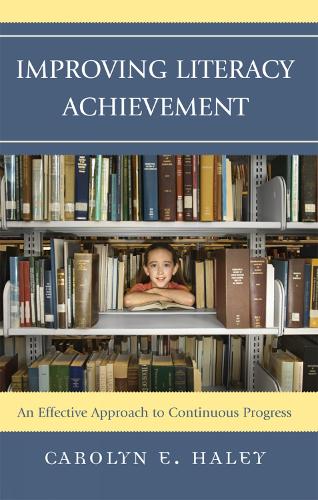
Improving Literacy Achievement: An Effective Approach to Continuous Progress
(Paperback)
Publishing Details
Improving Literacy Achievement: An Effective Approach to Continuous Progress
By (Author) Carolyn E. Haley
Bloomsbury Publishing PLC
Rowman & Littlefield Education
20th February 2007
United States
Classifications
General
Non Fiction
Educational: First / native language
Literacy (Theories of reading and writing)
372.6044
Physical Properties
Paperback
128
Width 141mm, Height 218mm, Spine 10mm
168g
Description
Billions of dollars are spent searching for programs and strategic plans that will prove to be the panacea for improving literacy achievement. With all of the experimental and researched programs implemented in school districts, the overall results are still at a minimum and many improvement gains have been short term. Improving Literacy Achievement focuses on literacy achievement through a Continuous Progress conceptual approach. This book features detailed steps for developing and implementing a literacy program for primary students in grades K-3 and includes chapters on looping, or continuous progress, at higher levels (grades 4-5). Carolyn E. Haley shows how looping at these levels proves to be an effective practice in increasing student achievement in all subject areas as evidenced in her research and extensive work.
Reviews
As an education reporter, I often saw educators shy from new ideas, but Haley's school was revolutionary and effective in its approach to literacy, and her students' reading scores quickly told the tale. This book is important, especially for parents and educators with students in poverty-stricken or low-performing schools. -- Ann O'Hanlon, former staff writer, The Washington Post
The continuous progress model is a child-centered, developmentally appropriate, effective program. It provides students the time necessary to acquire the reading skills to become proficient readers. At-risk students that come to school lagging in the background knowledge required for success in the traditional grades are never left behind. -- Sandra V. Carrillo, assistant principal, Prince William County (Virginia) Schools
Haley's book on successfully designing and implementing the continuous progress program to improve student literacy should be required reading for teachers, administrators, and researchers alike. This planned change intervention simultaneously provides an innovative and proven alternative strategy to the one-size-fits-all approach for teaching reading skills in the public school setting. -- Reginald Shareef, Ph.D., professor of political science and public administration, Radford University
Haley stepped out from the norm when she implemented for children a continuous progress model of instructional delivery at Triangle Elementary School, Prince William County, Virginia. She found a way to successfully meet children's needs at their appropriate levels of instruction. The success she achieved was simply phenomenal. -- Kris Pedersen, former associate superintendent, Prince William County (VA) Schools
Author Bio
Carolyn E. Haley, a teacher, administrator, and educational consultant has thirty-two years of experience in education. She has spent the past twenty-one years as a school administrator in both urban and suburban school districts.
